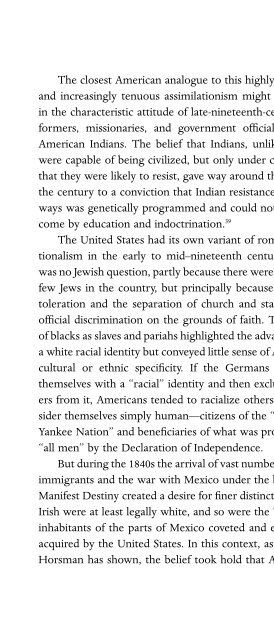Racism - A Short History - George M Fredrickson.pdf - WNLibrary
Racism - A Short History - George M Fredrickson.pdf - WNLibrary
Racism - A Short History - George M Fredrickson.pdf - WNLibrary
You also want an ePaper? Increase the reach of your titles
YUMPU automatically turns print PDFs into web optimized ePapers that Google loves.
APPENDIX <strong>Racism</strong> in Historical Discourse<br />
only one type of racism—what I would now call the “colorcoded”<br />
or somatic variety. A review of the historical discourse<br />
on racism that began in the 1920s reveals that the<br />
term was first applied to ideologies making invidious distinctions<br />
among divisions of the “white” or Caucasian race,<br />
and especially to show that Aryans or Nordics were superior<br />
to other people normally considered “white” or “Caucasian.”<br />
The term “race” has a long history, but “racism”<br />
goes back only to the early twentieth century, and the “ism”<br />
reflected the understanding of historians and others who<br />
wrote about it that they were dealing with a questionable<br />
set of beliefs and not undeniable facts of nature. It might<br />
be said that the concept of racism emerges only when the<br />
concept of race, or at least some of its applications, begin<br />
to be questioned. Our understanding of the core function<br />
of racism—its assigning of fixed or permanent differences<br />
among human descent groups and using this attribution of<br />
difference to justify their differential treatment—has<br />
changed less during the past century than have the specific<br />
categories of people who are viewed as its victims.<br />
The historiographies of the two most conspicuous<br />
manifestations of racism—white supremacism and antisemitism—have<br />
proceeded along different tracks. Historians<br />
and sociologists concerned with one kind of racism have<br />
generally shown little interest in the work done on the<br />
other. When racism has been a central concept in this<br />
work, it has often been defined in such a group-specific way<br />
that a wider application is made difficult, if not foreclosed<br />
entirely. For example, one can readily agree with the British<br />
sociologist Zygmunt Bauman’s short definition of racism,<br />
which precedes his discussion of how it applies to the Holo-<br />
156
















